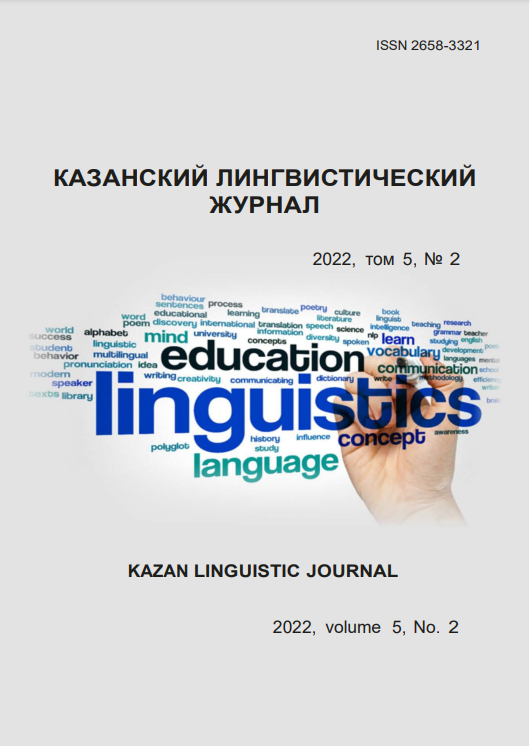Pedagogical model of teaching a foreign language in the inclusive educational environment of the modern school
https://doi.org/10.26907/2658-3321.2022.5.2.226-244
Keywords:
inclusion, educational technology, foreign language, pedagogical model, teaching, communication, interactionAbstract
The paper covers the issueof implementing the pedagogical model of teaching a foreign language in an inclusive educational environment of a modern school, which is based on the fundamental ideas and principles of inclusive pedagogy.The relevance of this article is due to the increased attention on the part of the world scientific and pedagogical community to the search for effective technologies for the practical implementation of the theoretical and methodological foundations of inclusion that contribute to the successful socio-psychological and pedagogical rehabilitation of children with special educational needs.The specifics of learning in the context of inclusive education, in particular children with special educational needs, is to take into account the wide range of needs of each child, increase attention to forecasting and remove difficulties in the education process, which requires flexibility and creativity on the part of the teacher in choosing strategies and learning technologies. The authors of the article focus on the issues of the research of effective inclusive technologies in the process of teaching a foreign language and their experimental testing in schools of the Republic of Tatarstan. The key results of the research are the developed pedagogical model that contributes to the to the formation and development of social and communication skills in children; pedagogical conditions for the development of these skills; criteria for the development of social and communication skills of children with special educational needs.
References
References
Kiryushina O.V. Organization of a foreign language lesson in an inclusive education. M.: Logos; 2020. p.41–52. (In Russ.)
Federal Law “On Education in the Russian Federation” dated December 29, 2012 N 273-FZ. (In Russ.)
Serikov V.V. Teaching as a kind of pedagogical activity: Proc. allowance ed. V.A. Slas-tenina, I. A. Kolesnikova. M.: Academy; 2008. 256 p. (In Russ.)
Kassie Shifere B. Inclusive Teaching In The Context Of English Language Teaching (ELT). International Journal of Physical and Social Sciences. 2019; 2 (11): 214-228.
Malofeev N.N. Inclusive education in the context of modern social policy. Education and training of children with developmental disorders. M.: Prosveschenie; 2010. p.3–10 . (In Russ.)
Sigal N.G. Current state and development trends of inclusive education abroad. Kazan; 2016. p. 203–206. (In Russ.)
Mitchell D. What Really Works in Special and Inclusive Education. Journal of Learning Disabilities; 2011. 139 p.
Suntsova A.S. Teoriya I tekhnologii inklyuzivnogo obrazovaniya. Uchebochnoe posobie. Theory and technologies of inclusive education. Izhevsk: Udmurt University; 2013. 27 p. (In Russ.)
Bondarenko I.A. The best inclusive schools in Russia. M.: Smysl; 2008. 73 p. (In Russ.)
Schramm R. Childhood autism and ABA. ABA: Therapy based on Applied Behavior Analysis. Yekaterinburg: Rama Publishing; 2013. 208 p. (In Russ.)
Boisvert M., Caron J., Borri-Anadon C. et Boyer P. Idéologies linguistiques véhiculées dans le programme de deuxième cycle du secondaire québécois de la discipline français langue d’enseignement. Le Bulletin du Centre de recherche sur l’enseignement et l’apprentissage des sciences (CREAS) Sherbrooke. 2020;7 (12): 243–252.
Ortiz A. A. Learning disabilities occurring concomitantly with linguistic differences. Journal of Learning Disabilities. 1997; 30 (22). 321–324






